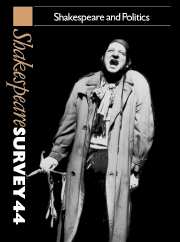Book contents
- Frontmatter
- Shakespeare and Politics
- Language, Politics, and Poverty in Shakespearian Drama
- Some Versions of Coup d’état, Rebellion and Revolution
- Woman, Language, and History in The Rape of Lucrece
- Love in Venice
- Two Kingdoms for Half-a-Crown
- ‘Fashion it thus’: Julius Caesar and the Politics of Theatrical Representation
- ’Demystifying the Mystery of State’: King Lear and the World Upside Down
- Tragedy, King Lear, and the Politics of the Heart
- The Politics of Shakespeare Production
- Shakespeare in the Trenches
- Shakespeare’s Earliest Editor, Ralph Crane
- Shakespeare’s Falconry
- Telling the Story of Shakespeare’s Playhouse World
- Shakespeare Performances in England, 1989–90
- Professional Shakespeare Productions in the British Isles January-December 1989
- Critical Studies
- Shakespeare’s Life, Times, and Stage
- Editions and Textual Studies
- Books Received
- Index
The Politics of Shakespeare Production
Published online by Cambridge University Press: 28 March 2007
- Frontmatter
- Shakespeare and Politics
- Language, Politics, and Poverty in Shakespearian Drama
- Some Versions of Coup d’état, Rebellion and Revolution
- Woman, Language, and History in The Rape of Lucrece
- Love in Venice
- Two Kingdoms for Half-a-Crown
- ‘Fashion it thus’: Julius Caesar and the Politics of Theatrical Representation
- ’Demystifying the Mystery of State’: King Lear and the World Upside Down
- Tragedy, King Lear, and the Politics of the Heart
- The Politics of Shakespeare Production
- Shakespeare in the Trenches
- Shakespeare’s Earliest Editor, Ralph Crane
- Shakespeare’s Falconry
- Telling the Story of Shakespeare’s Playhouse World
- Shakespeare Performances in England, 1989–90
- Professional Shakespeare Productions in the British Isles January-December 1989
- Critical Studies
- Shakespeare’s Life, Times, and Stage
- Editions and Textual Studies
- Books Received
- Index
Summary
The ways in which plays – including Shakespeare’s – are produced today are affected by political forces and structures both within theatres and outside them. Everyone who works in theatre is aware of this. A leading American dramatist has calculated that if the Manhattan Theatre Club produced nothing for one whole year except plays that he had written, and if – somehow – he had managed to direct all of them himself, he would then have earned less that year than the theatre’s Artistic Director. And this impossible work-load would also have brought him less money than the theatre’s Administrator, and less than its Development Officer. The message he received was that in this organization which is devoted to staging plays by living dramatists (who, unlike Shakespeare, are there to stand up for themselves), the writer has less clout than any of the people responsible for keeping the production machine rolling. It is also evidence that a theatre’s main problem today is to stay in business, to be able to produce, to have the funds and the people; and so, when a play is being produced, the task of serving its author is likely to be much less important than that of serving the institution and its administrators.
In Britain, theatres are kept in business by various state subsidies as well as by ticket sales to the public, and so the political forces at work are more evident. If in 1989 a director wished to produce Shakespeare at the Riverside Studios in London, he or she would apply to the local Hammersmith and Fulham Council for a grant, and would receive a fifteen-page questionnaire. Two pages are for a 'full account of your project' in which you must show 'the need for such a project and its relation to other similar services in the locality/borough'; and you must pay 'particular regard to the implementation of equal opportunities practices'. You must also 'describe how your project proposes to monitor and evaluate its effectiveness'. Three further pages are devoted to financial details, and one to a description of company organization. Three pages provide the necessary instructions for filling out the application, one of these being a list of telephone numbers for contacting council officials.
- Type
- Chapter
- Information
- Shakespeare Survey , pp. 91 - 104Publisher: Cambridge University PressPrint publication year: 1991
- 1
- Cited by

